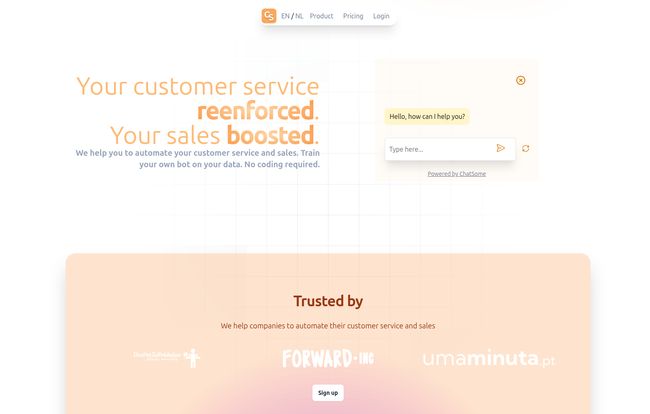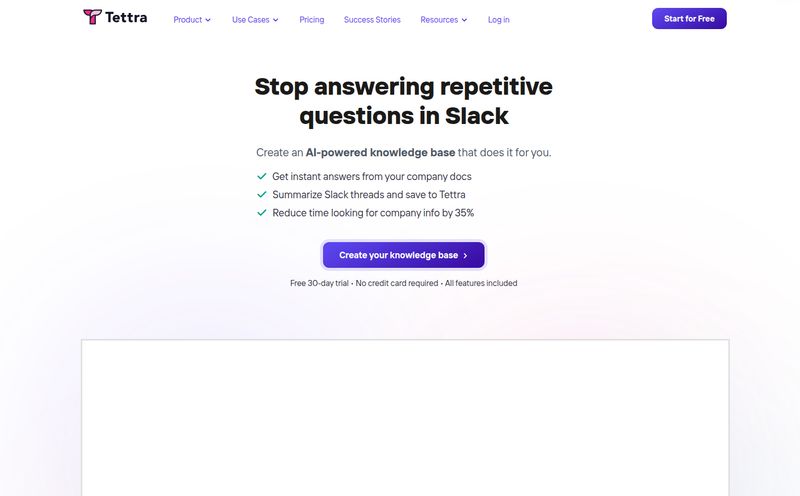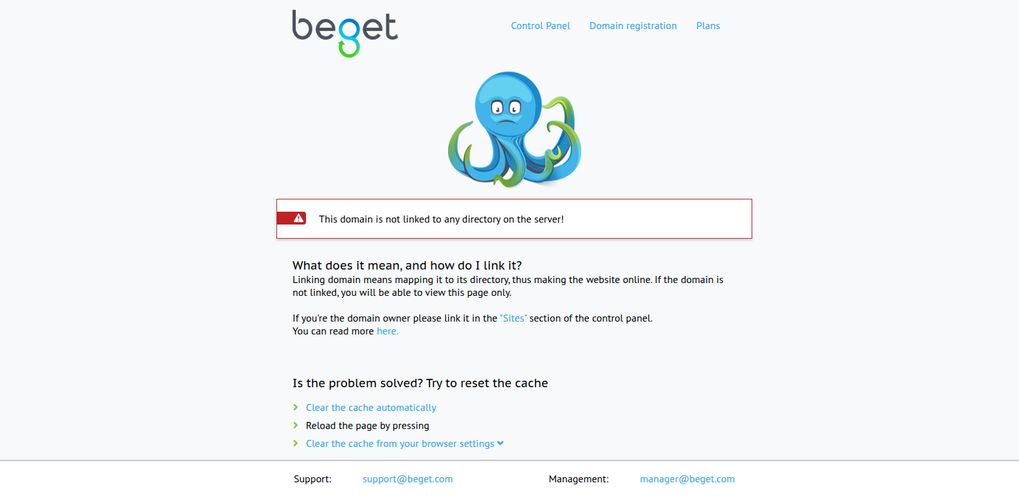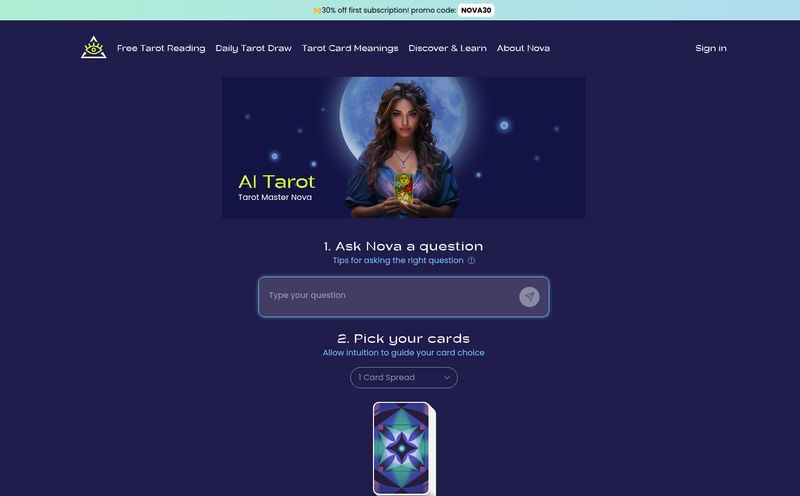We've all been there. You land on a website, you have a simple question—maybe about shipping, or if a product comes in blue—and you're met with two soul-crushing options: a contact form that feels like shouting into the void, or a clunky chatbot that can only say "I'm sorry, I don't understand." Ugh. The immediate frustration is enough to make you close the tab and buy from a competitor.
For years, as an SEO and traffic guy, I've seen this exact scenario play out in analytics. A potential customer, ready to buy, just leaks out of the funnel because of a tiny, unanswered question. It’s painful to watch. We’ve been promised a future of helpful AI assistants, but mostly we’ve gotten glorified FAQ pages that can't even handle typos.
So, when I came across a platform called Chatsome, which claims to not just automate customer service but also boost sales, my professional curiosity was piqued. But so was my skepticism. Another chatbot? Really? But this one seemed a bit different. Based in Amsterdam, with a clean look and a big promise: a bot you train on your own data. No coding required. Okay, you have my attention.
So What is Chatsome, Really?
At its core, Chatsome is an AI-powered chatbot platform. But let's ditch the jargon. Think of it less like a robot and more like a tireless digital concierge for your website. You don't just plug it in and hope for the best. Instead, you feed it your own information—your product descriptions, your shipping policies, your knowledge base, your blog posts. Everything. It digests all that content and becomes a genuine expert on your business.
This is the secret sauce, in my opinion. It's what separates a tool like Chatsome from the legion of terrible, rule-based bots out there. It doesn't just follow a script. It uses powerful AI (the Enterprise plan even gives you access to the latest GPT models) to understand the intent behind a user's question and provide an intelligent answer based on the data you gave it. Suddenly, “Do you ship to canada?” doesn't result in an error message, but a helpful, accurate response.
The Big Promises: Reinforcing Service and Boosting Sales
The Chatsome homepage makes two pretty bold claims right at the top: "Your customer service reenforced" and "Your sales boosted." Let's break that down, because that's what we're all here for, right? The results.
Freeing Up Your Overworked Human Team
Every customer service team I've ever talked to spends at least half their day answering the same ten questions over and over. "What are your hours?" "How do I track my order?" "What's your return policy?" It's necessary work, but it's also a massive time-sink that prevents your team from handling the truly complex issues that require a human touch.
Chatsome aims to take over that first line of defense. It eliviates your team from those repetitive tasks. By being available 24/7 to answer the simple stuff, it acts as a filter. Your customers get instant answers without waiting for an email reply, and your human agents can focus on the high-value conversations. It's a classic win-win.
The 24/7 Salesperson That Never Sleeps
Here's where it gets really interesting for me. A good chatbot isn't just a defensive tool; it's an offensive one. When a visitor is browsing your products at 2 a.m., they might have a question that, if answered, would lead directly to a sale. Without a 24/7 assistant, that sale is probably lost.
Chatsome is designed to be that assistant. It can expose your products directly through the chat, guiding users to what they're looking for. Imagine someone asks, "Do you have any vegan leather bags under €100?" Instead of leaving the user to fumble with filters, the bot can provide direct links and information, closing the gap between question and conversion. That's not just service; that's active selling.
Setting It Up: Is "No-Code" a Fantasy?
The term "no-code" gets thrown around a lot these days, and sometimes it's a flat-out lie. So, what's the deal with Chatsome? From what I can gather, it's genuinely straightforward. They claim it only takes about five minutes to install the widget on your website, which is pretty standard stuff.
The real work—and I wouldn't even call it 'work' so much as 'investment'—is training the bot. This is the part some people might see as a downside. You have to provide the data. But honestly, how could it be any other way? You can't expect a new employee to know your business without some training, and it's the same for an AI. The time you spend feeding it your company knowledge is what makes it valuable. An untrained bot is useless. A well-trained one is an asset.

Visit Chatsome
Making It Yours: Chatbot Branding Matters
I have a personal pet peeve with generic-looking third-party tools on websites. A chatbot that looks completely alien to the site's design immediately erodes trust. It feels tacked on and impersonal. Chatsome seems to get this. They make a point of highlighting customization. You can change the colors of the chat bubble and messages to perfectly match your company's branding.
It sounds like a small thing, but it's not. When the chatbot looks like it belongs to your brand, it feels like an official, trusted representative of your company. It becomes the friendly face of your automated support.
Let’s Talk Money: Breaking Down Chatsome’s Pricing
Alright, the all-important question: what's this going to cost? The pricing structure is pretty transparent, which I appreciate. No hidden fees, just different tiers for different needs. Here's my breakdown:
| Plan | Price | Best For | My Quick Take |
|---|---|---|---|
| Basic | €350 / month | Low-traffic sites or testing | Frankly, the 100 conversations/month limit feels very tight. This seems more like a paid trial to see if the platform works for you before committing. Good for getting your feet wet. |
| Premium | €50 / 1000 messages | Scaling businesses | This is the most intriguing plan. Paying per message volume means the cost scales with your success. You get unlimited chatbots, which is awesome. Just be sure to monitor your usage so the bill doesn't surprise you. |
| Enterprise | Custom | Large companies | This is the whole shebang. Unlimited everything, dedicated support, custom integrations, and access to the latest GPT models. If you're a big player, this is the one you call them about. |
For the most current details, you should always check their official pricing page.
The Not-So-Shiny Bits (A Realistic Look)
No tool is perfect, and it's my job to be honest. Based on the information, there are a couple of things to keep in mind.
First, as I mentioned, you have to train the bot. If you have a chaotic, disorganized mess of documentation, your bot will be a chaotic, disorganized mess. It's a 'garbage in, garbage out' situation. This isn't a flaw of Chatsome, but a reality of AI. You need to be prepared to put in the initial effort to create a quality knowledge source for it.
Second, the variable pricing of the Premium plan can be a double-edged sword. It's fantastic for managing costs when you're starting out. But if you have a viral moment or a massive traffic spike, your bill will go up accordingly. It's predictable, but it's not a fixed cost, which some businesses might not like. You need to be comfortable with that model.
So, Should You Get Chatsome? My Final Take
After looking it all over, I’m genuinely optimistic about Chatsome. It seems to have sidestepped the biggest pitfalls of the chatbot world by focusing on what actually matters: intelligent, brand-specific conversations powered by a company's own data.
If you're a business owner who's tired of seeing potential customers slip away, or if your support team is drowning in repetitive questions, this is a tool worth investigating. It's not a set-it-and-forget-it magic wand. It's a powerful new employee that you need to train and manage. But if you do, it seems like it could pay for itself very, very quickly—both in recovered sales and reclaimed time.
Frequently Asked Questions
- How hard is it to train the Chatsome bot?
- It's less about difficulty and more about preparation. The process itself is simple—you provide the data. The hard part is ensuring your data (FAQs, product info, etc.) is clean, accurate, and comprehensive before you start. The better your source material, the smarter your bot will be.
- Can Chatsome integrate with my e-commerce platform like Shopify?
- The Enterprise plan explicitly mentions "Custom integrations," so for platforms like Shopify, Magento, or other business software, you'd likely need that tier. It's best to contact their sales team to discuss specific integration needs.
- Is Chatsome's pricing good for small businesses?
- The Premium plan seems best suited for growing small businesses. The pay-per-message model means you're not locked into a high flat fee if your traffic fluctuates. The Basic plan's 100-conversation limit might be too restrictive for all but the smallest sites.
- How is Chatsome different from a basic chatbot?
- The main difference is the AI and the training. Basic bots follow rigid, pre-programmed scripts (if-this-then-that). Chatsome uses AI to understand the meaning behind questions and pulls answers from the unique knowledge base you provide, allowing for much more natural and helpful conversations.
- Does Chatsome use GPT-4 or other advanced AI?
- Yes, the Enterprise plan specifically notes "Access to latest GPT," which suggests they incorporate cutting-edge models from providers like OpenAI to power their top-tier service. This enables more nuanced and human-like interactions.
Conclusion
In a world full of disappointing digital assistants, Chatsome appears to be a genuinely useful tool. It's a strategic partner that can reinforce your customer service and give your sales a much-needed boost, 24/7. It requires an investment of time to train it right, but for the right business, that investment could yield some serious returns. If you're ready to stop losing customers to simple, unanswered questions, it might be time to have a little chat with Chatsome.



